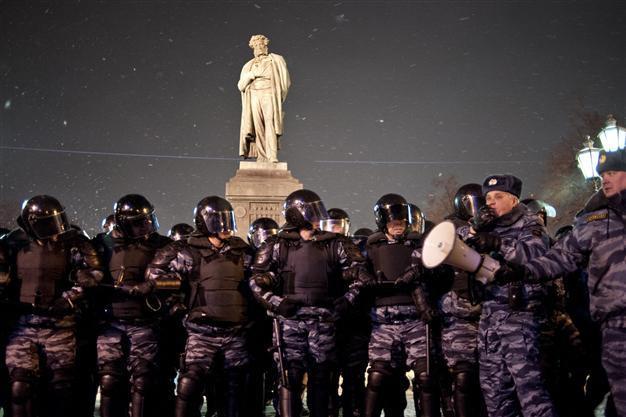Russian protesters fear Putin resorting to force
MOSCOW - Reuters

Riot police block a square during a protest by opponents of Vladimir Putin, Russia's prime minister, in Moscow, Russia, on Monday, March 5, 2012. ABACA photo
Russian opposition leaders accused Vladimir Putin of changing tactics to crack down on dissent after riot police detained hundreds of protesters challenging the legitimacy of his presidential election victory.
Black-helmeted police hauled away more than 500 people, including several opposition leaders, who attended unsanctioned rallies in Moscow and St Petersburg on Monday or refused to disperse at the end of a rally that had been permitted.
Many including Alexei Navalny, an anti-corruption blogger who has become a leading light of the protest movement, were quickly released but some faced the prospect of receiving short jail sentences on Tuesday.
After three months of protests that passed off peacefully, the police intervention sent a clear signal that Putin is losing patience with the opposition and will crack down if protesters step out of line.
But the restraint shown by most police, even as they bundled protesters into vans, also suggested that Putin is determined not to give his critics the chance to depict him as a dictator ready to suppress any challenge to his authority.
"The use of force and detention of opposition politicians could have been avoided," defeated presidential candidate Mikhail Prokhorov said in a Twitter message late on Monday.
"It was a peaceful rally. I am outraged by the use of force against people who came to express their views. Today's events at Pushkin Square broke the tradition of the recent peaceful protest rallies in the country."
Ksenia Sobchak, a television host who has fallen out with Putin, her late father's protege, said: "I was so hoping the regime would show generosity after winning."
Witnesses said that although some protesters were hurt, and one said her arm had been broken, officers seemed intent on avoiding casualties at the main protest on Moscow's Pushkin Square, often the scene of Soviet-era dissident protests.
But reporters saw police using tougher tactics against a group which tried to protest at Lubyanka Square, in front of the headquarters of the Federal Security Service, successor to the Soviet-era KGB.
The police had told protesters not to attend those rallies which had not been approved by the authorities and prosecutors warned some opposition leaders not to step out of line.
